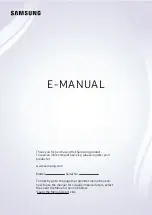
– 14 –
KV-J21MF1AK/J21MF3
KV-J21MN1AK/J21PF1
RM-883
•
The following adjustments should be made when a complete
realignment is required or a new picture tube is installed.
•
These adjustments should be performed with rated power
supply voltage unless otherwise noted.
Controls and switch should be set as follows unless otherwise noted:
PICTURE control ........................................................... normal
BRIGHTNESS control ................................................... normal
Perform the adjustments in the following order:
1. Beam Landing
2. Convergence
3. Focus
4. White Balance
Note : Test Equipment Required:
1. Color-bar/Pattern Generator
2. Degausser
3. Oscilloscope
SECTION 3
SET-UP ADJUSTMENTS
.................................................................................................................................................................................................................................
Fig. 3-4
Fig. 3-3
GREEN
BLUE RED
Fig. 3-2
Purity control
}
normal
Preparation :
•
In order to reduce the influence of geomagnetism on the set's
picture tube, face it east or west.
•
Switch on the power and degauss with the degausser.
3-1. BEAM LANDING
1. Input a white signal with the pattern generator.
Contrast
Brightness
2. Position neck assy as shown in Figure 3-1. (Except for KV-
J21PF1)
3. Set the pattern generator raster signal to green.
4. Move the deflection yoke to the rear and adjust with the purity
control so that the green is at the center and the blue and the red
take up equally sized areas on each side.
(See Figures 3-1 through 3-3.)
5. Move the deflection yoke forward and adjust so that entire
screen is green. (See Figure 3-1.)
6. Switch the raster signal to blue, then to red and verify the
condition.
7. When the position of the deflection yoke has been decided,
fasten the deflection yoke with the screws.
8. If the beam does not land correctly in all the corners, use a
magnet to adjust it. (See Figure 3-4.)
Deflection yoke positioning
corrects these areas.
Purity control corrects
this area.
Disk magnets or rotatable
disk magnets correct
these areas (a-d).
b
c
a
d
b
a
c
d
Neck assy
G1 G2 G3
Fig. 3-1















































